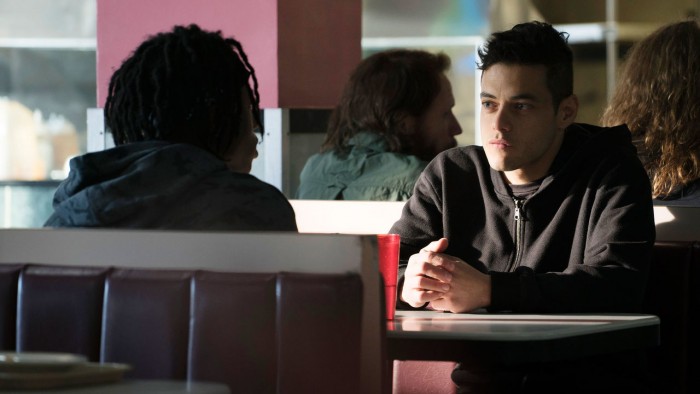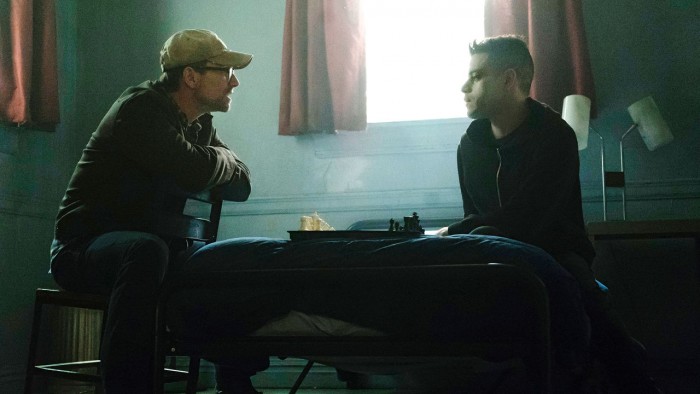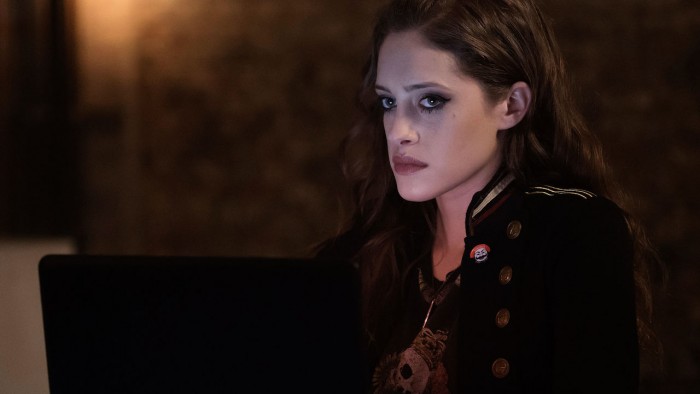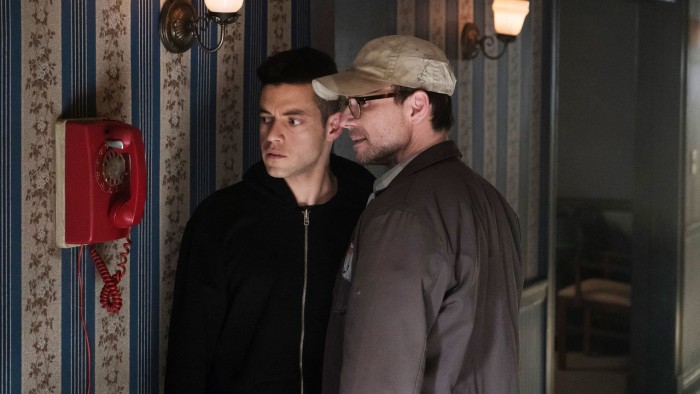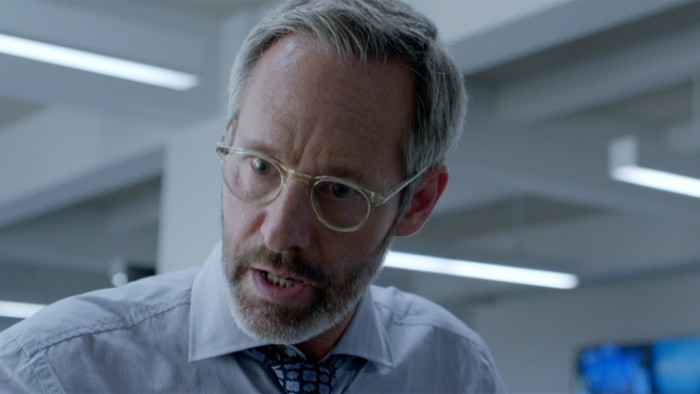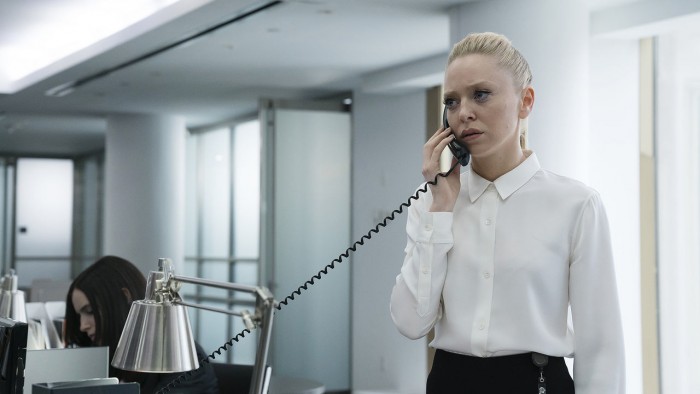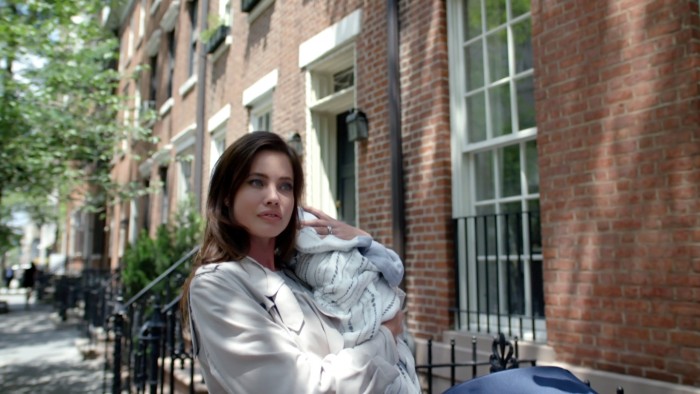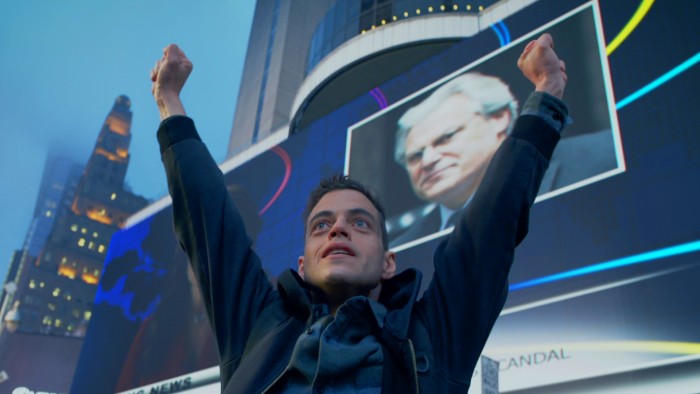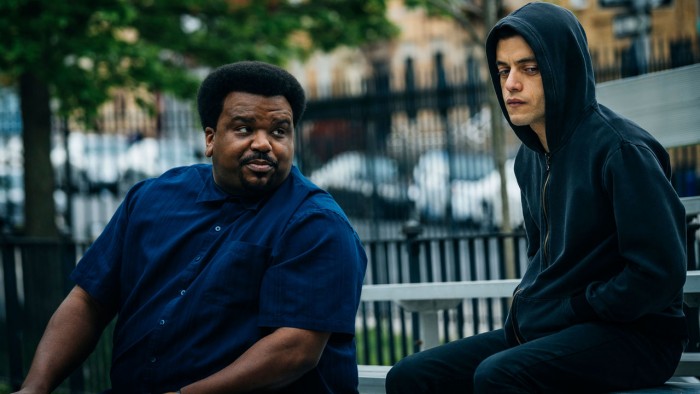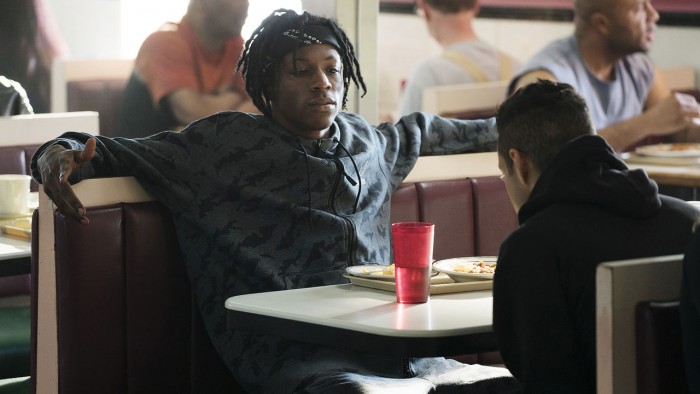Mr. Robot Season 2 Premiere - The 10 Biggest Questions From 'Unmask'
The long wait is over. Mr. Robot is finally back to occupy the airwaves and our brainwaves. In the post-Breaking Bad landscape of television, perhaps no other series is this primed for a cultural takeover. Mr. Robot checks all the important boxes: slickly made, with propulsive plotting, anti-hero psychodrama, and even some weird sex stuff thrown in for good measure. More impressively, the show feels uniquely current, embedding itself in the modern technological landscape like no other TV series or movie ever has. It's a show "about" our world, and given the speed of social and technological change, it's oddly comforting to have Mr. Robot back on our screens to center us.
Then again, if astute commentary on technology and anarchist revolt were all Mr. Robot offered, it wouldn't really be worth the hype. Social satire isn't hard to come by. Instead, what Mr. Robot does better than anything else out there is tie the fact of our modern technological life to the very real social and mental disorders afflicting us. Our main character, Elliot, suffers from some kind of severe schizophrenia, but all the characters seem to suffer from one kind of mental illness or another. It's the depressive state of a world in which everyone is connected 24/7, but crushing loneliness haunts us still.
All these ideas lead us to a series of questions opened or addressed by the great two-part season premiere, "Unmask." Of course, there are spoilers ahead for the episode.
What happened to Elliot after the hack?
Last we saw of our favourite multiple-personality uber-hacker, Elliot was being embraced by imagined visions of his family. Reality has turned out a little less pleasant. Over a month later, Elliot is now living with his mother, locked in a strict routine, denying himself access to a computer. It's a "perfectly constructed loop," Elliot says. A way of setting himself on a straight, simple path. One in which he doesn't need to think much, or meaningfully interact with the rest of the world. He has a friend, Leon, who blathers on about Seinfeld. He goes to the neighborhood basketball court to watch the guys shoot hoops, despite not caring at all about sports. "But I do see the beauty in the rules," Elliot says. "The invisible code of chaos hiding behind the menacing face of order."
Are Elliot's coping mechanisms really working?
It's all about structure. Monk-like structure is what Elliot thinks he needs to rid himself of Mr. Robot. That side of himself, the radical side come to life in the image of his dead father, pesters him endlessly, urging him to get back into the world of hacking and global anarchic ambition. For Elliot's part, it's not the hacking he has a problem with, but his own lack of self-control. The regimen he's created for himself is his way of trying to regain control. The ultimate end of which would be to get back the blackout moments, to learn where Tyrell Wellick is. But we'll get there a bit later. In the meantime, he's got Mr. Robot to contend with, and it's a difficult fight. Mr. Robot shoots Elliot in the head. Not for real, of course, but it's startling, at least to us. For Elliot it has seemingly become routine. A facet of his current existence he has learned to control, despite Mr. Robot's protestations that, "this control you think you have, it's an illusion."
Where is fsociety now?
With Elliot out of the picture, fsociety has morphed. Two of its original members have apparently left the group, replaced by newer followers. "They were only half in," Darlene says. Darlene is now running the show out of the hacked smart home of E Corp's general counsel, Susan Jacobs. Things are hardly rosy at Chez fsociety, though. The party atmosphere is undercut by the pitiful gains Darlene outlines to the group. Their revolution was anything but. While the hack last season brought E Corp's servers down, it didn't bring the system to its knees. "Why does it feel like they're still winning?" Darlene asks. "That what we did made it worse not better?" It's a valid question. The systems of control at the top may have taken a hit, but they're still the most powerful systems in place, bearing any pressure right back down on the average person. It's a personal blow, particularly given what has happened to Darlene's brother in the process. As Darlene sits alone, crying on the floor of the bathroom in this expensive house, we're reminded of a similar scene from the series pilot. Elliot sitting alone in his apartment, squeezed into a corner, crying. Too lonely to cope. What good is revolution if it can't even bring us closer together?
How bad are things for E Corp?
Despite Darlene's intuition that nothing has fundamentally changed, somethings have. E Corp may still have immense power, but they've also proven vulnerable. This is emphasized once again by a new hack initiated by Darlene and Mobley, who as it turns out works IT at E Corp. The hack locks down E Corp's banking systems, demanding an in-person payment of $5.9 million, delivered by a chief officer. Our good friend Scott Knowles, CTO, volunteers. He ends up forced to wear an fsociety mask in the middle of Battery Park while pouring gas on the pile of money and lighting it aflame. These are hardly the actions of a company in full control, but it's not fundamentally devastating either. The tendrils of power are too difficult to break with just one or two big hacks. Something more is needed.
And where is Gideon Goddard in all of this?
Gideon Goddard, CEO of Allsafe, is perhaps the closest thing Mr. Robot has to a conscience. In the ensuing drama over the E Corp hack, Allsafe has been practically destroyed, and Gideon left to take the fall. He shows up for a visit with Elliot, explaining that he is under FBI investigation, pleading with Elliot for help. Mr. Robot stands there, pressing Elliot to help Gideon. "Could you live with yourself knowing that you framed Gideon?" Of course not, but then such moral thinking isn't what drives that part of Elliot's psyche. Mr. Robot wants Elliot to start hacking again. Elliot must refrain, even if it means a friend of his gets hurt. Gideon, for his part, is pushed into a serious corner himself, threatening to reveal what he knows about Elliot to the FBI. The threats don't get him far. Elliot is too damaged.
Is Angela still working for E Corp?
One of the more surprising turns last season was Angela accepting a job at the evil corporation she was trying to sue. Terry Colby had implored her to take the position as a way of making change from within. Whether Angela still intends that is unclear. For now, she's become a PR drone, hated by her co-workers for having ascended so quickly. She ruthlessly negotiates terms for television interviews, making sure tough questions are off the table. She has become cold, something we got a hint of last season's finale when she went to replace her shoes, stained by the blood of the E Corp executive who shot himself in front of her. At a bar, Angela meets with her lawyer, Antara Nayar, who becomes angry that she has decided to continue working for E Corp, that she's fallen into their grip. To what extent Angela is aware of her descent is unclear, but after taking a stranger from the bar home with her, we find her watching corporate self-help videos alone at night. "I recognize myself as exceptional," the video urges her to repeat out loud. Not a bad sentiment, but in context, utterly devoid of real meaning. These are the things we tell ourselves to sustain us when our world has fallen apart.
What is Joanna Wellick up to with Tyrell missing?
Our new favourite Lady Macbeth-in-the-making has taken up with another man. Scratch that. She's found herself a boy toy. A naive guy who she uses for her S&M fantasies, but who clearly doesn't match up to her intellect or ambition. He's young, fit, and attractive, but not much else. So she's in a waiting game, lounging in beautiful bathtubs, taking care of her baby, counting down until receiving word from Tyrell about where he's been and what he's been doing. When she arrives home, she finds a gift at her doorstep. Inside, there's a music box with a phone taped to it. It appears to be from Tyrell, but on Mr. Robot appearances can be deceiving. Near the end of the episode, the phone rings from an unknown number, but Joanna misses the call, having gone to check on the baby.
How far do the tendrils of E Corp’s power extend?
In one of the more curious scenes of the premiere, E Corp CEO Phillip Price meets with three government officials in a smoky room, discussing the terms of a bailout, all set to the score from The Parallax View. Politically it's difficult, but Price won't hear "no." They want him to resign, but that's not going to happen. He coolly describes the nature of the "con" they are perpetrating. A con of actual confidence. The bailout is necessary not just for pure financial reasons, but to sell confidence to the public. To con them into believing things are stable, that everything is under control. It doesn't matter that nothing could be further from the truth, so long as the public believes it. So long as they can be sold that bill of goods. That's where E Corp has its advantage. That's where its power comes from.
Is anyone safe?
Poor Gideon. Earlier in the episode we see him pleading with Elliot to save him from the fall. After Elliot declines, we see Gideon meet with the FBI's Agent Dom DiPierro, played by new cast member Grace Gummer. What they discuss is anyone's guess, and sadly we won't find out from Gideon himself. Sitting at a bar, he's approached by a man who seems to be hitting on him. The man recognizes him, referring to him almost affectionately a fall guy for E Corp and the hack. "It's obvious why the use you as a patsy," the man says. "You give off a very sympathetic, honest vibe. You're the perfect vessel for their lies." But just as it seems the man is friendly, his insane motives are revealed. "You may just be a patsy, but you're an important one. In fact," he says, "I don't think I've ever met a bigger crisis actor than you before." The man pulls out a gun. "This is for our country," he says, before shooting Gideon point blank in the neck. Much like Shayla's death last season, Gideon's is as depressing as it is shocking. In such a dark world, the truly good people, the people whose only mistake is to try living with some degree of friendly honesty, are cast aside. It's a cruel death. More than undeserved, it exemplifies the powerlessness of our actions in the face of a social order that devalues individual humanity.
Can you really trust the devil you know?
"Better the devil you know, than the devil you don't," Elliot tells Krista, his psychiatrist, when she asks why he chose to stay with his mother, whom he credits with much of his psychological trauma. It's a false explanation, though. Elliot hardly even knows himself, let alone those around him. Even in his voiceover narration to the audience, he says he can't trust us. It's to the point where he cuts off scenes before crucial information is given. He tells us this after having dropped out of a scene with Krista. She asks him a question, but we don't get the answer. Not long before that, we see a flashback to Elliot's childhood, when his dad pushed him out of a second story window. At the hospital, the doctor begins asking him questions, but the audio starts dropping out, and the scene cuts off. Maybe we're not ready to interrogate these events yet. More likely, Elliot himself isn't ready. His memories are encrypted in a way. His fight is to decrypt and gain access to his own psyche. We're along for the ride.
While watching a basketball game, a man named Ray, played by newcomer Craig Robinson, strikes up a conversation. He's heard of Elliot and his skills with hacking. While not-so-subtly trying to recruit Elliot's help in that department, Elliot shuts him down. The next day, Ray is there again, this time talking about how they met the night before. Elliot remembers none of this. He's experiencing blackouts. Maybe his self-control really is an illusion. He's confronted by Mr. Robot, once more holding a gun. But Elliot stands his ground. He may not be fully in control, but he asserts his dominance over the destructive part of his psyche anyway. Shoot him all he wants, Mr. Robot cannot destroy Elliot's will. He needs to know where Tyrell is.
While attending his routine church group, Elliot slowly nods off. Suddenly he's awake, in the hallway at home, phone in hand, calling someone. The line is picked up on the other end, but nobody talks. "Hello?" Elliot says.
"Bon soir, Elliot," answers Tyrell. And we're off to the races, it seems.
Stray Thoughts

